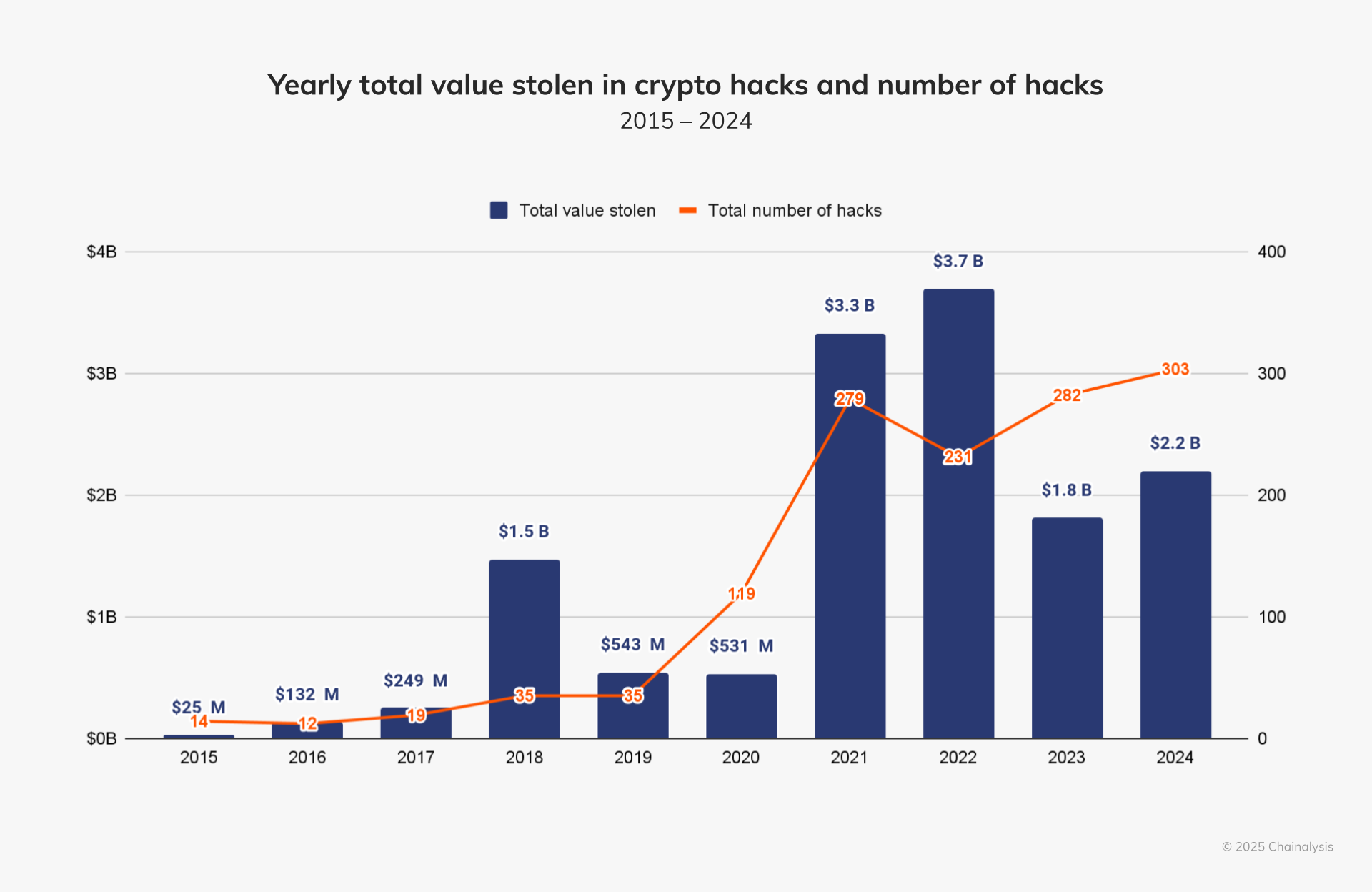

Top Web3 Security Auditors
Table of Contents
In the fast-paced Web3 environment, security auditors are essential for the integrity of decentralized systems. But what exactly do they do?
Security auditors use their expertise in decentralized systems to check the integrity of code and identify weaknesses in blockchain applications. Once found, they pinpoint potential risks and provide developers with recommendations to address these vulnerabilities.
To illustrate the importance of collaborating with a reputable security auditor, consider the Chainalysis report.

In 2024, various hacks resulted in the theft of $2.2 billion, representing a notable 21% increase from 2023.
Now that we know the importance of partnering with a top blockchain security auditor, let's explore our options.
MixBytes
MixBytes has provided audit services since 2017. It has conducted over 200 audits for more than 50 different protocols, including AAVE, 1inch, Curve, Clearpool, Fantom, Mantle Network, Yearn Finance, and Lido. A complete portfolio is available on MixBytes' GitHub.
MixBytes' core expertise is auditing smart contracts written in Solidity and Vyper languages and running on EVM-compatible blockchains.
https://mixbytes.io/
MixBytes Methodology
MixBytes fosters long-term client relationships by maintaining a small, focused team and ensuring high-quality, thorough manual performance audits.
Dedicated team
They allocate a team of three full-time senior auditors to each project and work exclusively on it within the allotted period. They also assign a CTO to supervise the QA for each project.
MixBytes usually assigns the same experienced audit team in subsequent audits, which helps streamline the customer onboarding process.
Manual hacking
In the first phase of the interim audit, each team member examines the customer’s source code, tests, and documentation using MixBytes’s methodology and code analysis tools as needed.
All MixByte team members adopt a white-hat hacker mindset. They invent new attack vectors to find potential vulnerabilities, including nontrivial ones. They also use an internal vulnerability checklist collected throughout the company's history.
Mainnet contracts certification
After all contracts are fixed and deployed to the mainnet, the MixBytes team verifies the contracts' code deployments against the code of the audited contracts. If everything matches, they issue a final certification report.
We have been collaborating with the Holdex team for several years, conducting audits of smart contracts from their portfolio projects. The team consistently provides prompt and high-quality feedback, adhering to industry best practices in security. Their commitment to ensuring the highest level of safety is truly commendable.
Hashlock
Hashlock has provided audit services since 2022. It has conducted hundreds of audits for protocols including Manifest AI, Peaq (DePin), and Vana. Hashlock has a range of expertise in auditing different ecosystems and languages, including Solidity, Rust, and Go.
https://hashlock.com/
Hashlock Methodology
Hashlock's audit reports are designed to be accessible to technical and non-technical audiences. They believe in transparency, and, with client approval, their reports can be made public to educate the community. Hashlock builds client trust and credibility by promoting completed audits through various channels, including industry partners, social platforms, email, and press releases.
Comprehensive Code Analysis
Hashlock's code analysis process meticulously combines automated and manual review. Initially, static analysis is employed to detect syntactical errors and potential vulnerabilities. This is followed by dynamic analysis, testing the contract's behavior under various conditions. The final stage involves a manual, line-by-line code review by Hashlock's team, concentrating on logical problems and adherence to established best practices. This multifaceted approach ensures a thorough code examination, minimizing the chance of overlooked vulnerabilities.
Simulated Protocol Interactions
Hashlock employs simulated protocol interactions to assess smart contracts' real-world behavior. This entails devising test scenarios that mimic user and contract interactions within the system. By simulating these interactions, Hashlock can pinpoint potential process flow, critical path, and critical function issues. This approach helps uncover vulnerabilities that might only surface under specific conditions, ensuring a thorough security evaluation.
Reporting and Transparency
Hashlock provides clear and transparent audit reports, even for those without a technical background. With client approval, reports can be made public. They include pre-audit research, daily developer communication, preliminary findings, and marketing graphics. This ensures clients understand audit results and can effectively communicate their project's security to users.
CertiK
CertiK, founded in 2017 by Ronghui Gu, Zhong Shao, and Jie Li, is a renowned smart contract auditor specializing in securing the Web3 world. CertiK has audited over 3500 projects, including Terra, Binance Smart Chain, Injective Protocol, PancakeSwap, Terra, Aave, SandBox, ShibaSwap, and Polygon, ensuring their security and integrity.
https://www.certik.com/
Methodology
Formal Verification as a Core
CertiK's formal verification framework checks every possible way a smart contract could run, ensuring it's secure. They use math to prove the code is correct and safe from bugs or attacks. This thorough process gives strong confidence in the contract's security.
Hybrid Approach
Formal verification is central to CertiK's methodology, complemented by manual code review and dynamic testing. This comprehensive approach combines automated analysis with human expertise to effectively identify and mitigate potential risks.
ConsenSys Diligence
ConsenSys Diligence, founded in 2017 by Ethereum co-founder Joseph Lubin, serves as the auditing arm of ConsenSys, leveraging a vast network of Web3 developers, experts, and communities. ConsenSys Diligence has audited over 150 projects across various Web3 platforms, including notable projects like Uniswap, MakerDAO, and Yearn Finance, ensuring their security and reliability.
https://diligence.consensys.io/
Methodology
Risk-Based Framework
ConsenSys Diligence prioritizes risks relevant to the project, optimizing audit resources to focus on critical vulnerabilities. This approach involves a thorough risk assessment to tailor the audit process to each project's specific needs and potential threats.
Formal Verification Techniques
While not solely reliant on formal methods, ConsenSys Diligence strategically leverages them for high assurance. This involves formal verification tools and techniques to verify smart contracts' correctness and robustness against potential attacks.
SlowMist
SlowMist, established in 2018, excels in providing holistic security solutions for the entire blockchain ecosystem with a focus on the Asian market.SlowMist has audited over 100 projects within the Web3 ecosystem. Notable projects audited by SlowMist include Tron, Huobi Global, and Ontology, showcasing their dedication to securing prominent platforms in the Asian blockchain market.
https://www.slowmist.com/
SlowMist Methodology
Hybrid Approach
SlowMist combines automated tools with manual code review to ensure comprehensive coverage of security vulnerabilities. This approach integrates automated scanning and analysis with human expertise to identify known vulnerabilities and potential emerging threats.
Dynamic Testing
Focusing on fuzzing and penetration testing, SlowMist's methodology helps unearth real-world attack vectors and weaknesses in blockchain projects. This dynamic testing approach simulates various attack scenarios to evaluate audited systems' resilience and security posture.
Conclusion
In the Web3 world, security auditors help protect decentralized systems from threats. Companies like MixBytes, CertiK, ConsenSys Diligence, and SlowMist have shown effective methods for building trust.
These auditors keep improving their skills and focus on reducing risks. As we deal with the complexities of Web3, their work provides a secure base for innovation.
If you're eager to learn more about security audits or want to connect with our security partners, please contact us, and we'll be glad to assist you!

